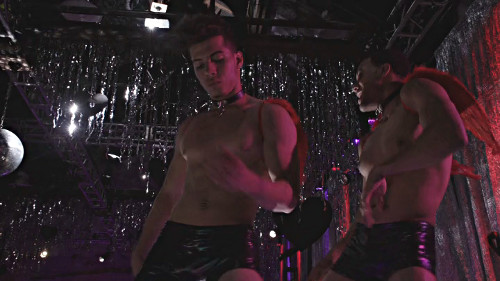Serious cynicism
Blunt Talk and You’re the Worst are both shows where the premise depends on our cynicism about redemption narratives. Blunt Talk begins with Patrick Stewart’s character Walter Blunt standing on top of a police car drunkenly declaiming Shakespeare. This sets up a parody of the now-familiar PR-ed apology and public appeal for forgiveness, including a stirring avowal of the importance of journalism (which leads to a staged outside broadcast from a fake hurricane in a porn studio forced to rent out its space because of Los Angeles’s mandatory condom laws’ effect on the porn business) and attendance at alcoholics anonymous (with a last minute switch to Sex Addicts Anonymous for Walter and Gamblers Anonymous for his manservant Harry. “That’s a good idea; you love gambling,” says Walter). But when this sex-addict adventure goes south leaving Walter and Harry mournfully discussing loneliness in a suburban boat, the show reveals that it might be taking the redemption narrative more seriously.
We see more of the various neuroses of the supporting characters, and their attempts to deal with them are treated fairly empathetically. The problem is that the show seems to view taking the characters seriously as incompatible with taking them comedicly. As the characters deal with their difficulties, the outrageous behaviour we had encouraged to laugh at dries up and the show doesn’t seem interested in finding a different form of comedy to replace it, to the extent that most recent episode seemed not to have any jokes in it at all.
You’re the Worst, on the other hand, gets better and funnier as it takes its characters more seriously. The show sets out its ambivalence about the idea of redemption in the first episode. The premise of the show is cynicism – the two main characters, Jimmy and Gretchen, after each being repeatedly told that they are “the worst” at relationships, decide that if their relationships are doomed to fail, they might as well date each other. But the show is also self-aware about the non-cynical investments that underpin cynicism about romance: at the end of the pilot episode, Gretchen says, “I’m scared of this shit; I don’t like it.” And its this combination of seriousness with cynicism (or seriousness about cynicism?) that allows the show to keep being both funny and moving.
The way the redemption narrative goes in Blunt Talk (and in many such stories) is, you start trying to be a better person and you either fail humorously or succeed and the comedy stops. What You’re the Worst realises is that there’s really no limit to the ways you can fuck up, so redemption isn’t a series of successful or failed attempts at being a better person; it’s a series of successful attempts at being a better person in which you are still, nonetheless, a terrible person. The usual redemption narrative is one in which you become a better person by becoming a different person. But what if you wanted to be better but didn’t want to give up your self? That’s what You’re the Worst is exploring, and in doing so it employs one of my favourite tropes in TV, the character who ethically refuses happiness. What I mean by this is the refusal of the moralizing blackmail that insists that happiness will be your reward for conforming to social norms. This depends on a claim that properly ordered desires will make you happy; what I like about the characters in You’re the Worst is that they do what they want even when it makes them unhappy. And the show is willing to explore at length the outcome of this heroism of desire.
(I couldn’t figure a way to work it in to the post itself, but I also want to link to Jane’s excellent post on You’re the Worst and the malleability of rom-com forms.)
